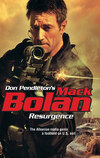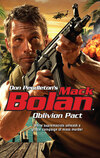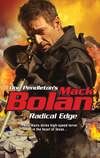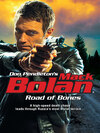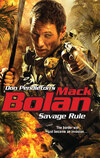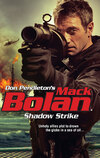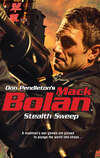Kitabı oku: «Resurgence», sayfa 5
CHAPTER SIX
Kombinat, Tirana, Albania
Rahim Berisha hated to receive bad news. That quality didn’t set him apart from any other person on the planet, but his temperament and reputation made his various associates leery of breaking news Berisha might not wish to hear.
Killing the messenger, for him, was more than a cliché.
Still, problems had to be recognized, examined—and, if possible, resolved. The first step toward a solution was admission that a failure had occurred.
Berisha slept till noon most days, as a concession to his night-prowling lifestyle. Most days, his business was concluding as the sun rose, driving the nocturnal folk back into hiding.
Pimps and whores. Drug addicts and compulsive gamblers. Thieves and smugglers.
All were creatures of the night. Berisha’s people.
No. They were his subjects.
In the afternoons, he dealt with daylight dwellers: politicians and police, judges and lawyers, so-called “honest” businessmen who came to him with hats in hand and open palms outstretched for money.
Everyone Berisha knew craved something. It was human nature, and the failing of his race. That understanding had already made him rich beyond his childhood’s wildest dreams.
And in the months to come, he would grow richer still.
Unless someone spoiled it for him.
That was always possible, of course. Berisha might be rich and powerful, a cunning strategist and ruthless fighter, but was not superhuman. He couldn’t be in two places simultaneously, much less several hundred places, supervising every transaction carried out by his subordinates.
A leader had to delegate authority, which meant he had to trust the people he had placed in charge of different tasks and territories. Those subordinates had to fear him more than they feared loss of cash and status. More than they feared prison.
More than they feared sudden death.
His servants had to be constantly aware that failing him, betraying him, would bring about worse punishment than anything their adversaries could devise—a screaming death that might go on for days.
Berisha understood, therefore, how Zef Kaceli felt when he came knocking on the study door and said, “There’s another call from the United States.”
Kaceli added an apology and said, “Line one, sir.”
“Thank you.”
Berisha braced himself as he picked up the telephone, depressed the lighted button for line one, and said, “Hello.”
He didn’t recognize the voice that answered him, wasn’t expected to, in fact. The caller introduced himself as Ali Dushku and the name clicked instantly. Dushku was Arben Kurti’s chief lieutenant in the far-off territory of New Jersey, U.S.A.
“What is it, Ali?” Berisha asked, taking pains to keep it casual, while he was calculating time zones. Half past noon in Tirana made it 6:30 a.m. along the eastern seaboard of America.
Dushku made a pathetic gulping sound, as people did sometimes to clear their throats before delivering dire news. And well he might, since this news was the very worst.
Arben Kurti was dead, along with Lorik Cako and at least two dozen of their soldiers. Federal agents and police were picking up the pieces, questioning whatever stragglers they could find. A second large, expensive property had been destroyed by unknown enemies who came and went as if they were invisible.
“What of the clients?” Berisha asked, all business to the bitter end.
“Missing,” Dushku replied. “Most likely dead. The house burned down. They may have been inside it.”
“And the merchandise?”
“Recovered by police.”
Of course. Perfect.
“I’m sorry,” Dushku blurted out. “Arben insisted I remain in Newark. If I’d been there, sir—”
“Then you would be a corpse,” Berisha interrupted him. “I would be learning of your death from someone else.”
Dushku fell silent then, waiting.
“Avoid contact with the police if possible,” Berisha ordered. “If they find you, tell them nothing. Since you weren’t with Kurti, you can’t tell them what became of him. As for the customers and merchandise, you know nothing.”
“Nothing. Yes, sir.”
“Give me your cell-phone number.”
Dushku did as he was told. Berisha memorized the number, as he had so many others. An eidetic memory was priceless in the world of crime, where written records were a threat to liberty or life itself. Albania had ratified Protocol Number 13 of the European Convention on Human Rights in 2007, forbidding capital punishment under any circumstances, but life in prison was no life at all.
Control of evidence and witnesses was critical.
“I’ll have instructions for you soon,” he told Dushku, then broke the link without goodbyes.
Before he made another move, Berisha needed to assess the situation.
And he might require advice.
Aboard Air France Flight 9
THERE WAS NO direct commercial flight from New York City to Marseille. Air France Flight 9 departed JFK International at 11:30 p.m., bound for Paris-Charles de Gaulle Airport, with touchdown at half-past noon the following day. From there, Flight 7666 connected to Marseille Provence Airport, arriving at 5:10 p.m. Total time in transit, barring unforeseen delays: ten hours and forty minutes.
Why Marseille?
Mack Bolan and Natalia Volkova had discussed bypassing France and moving on directly to Albania, but then dismissed the thought. Letting a major portion of Rahim Berisha’s syndicate survive intact—the Marseille hub that handled drugs and human trafficking into the western hemisphere, along with other nasty rackets locally—would mean leaving their job unfinished, even when the viper’s head was severed.
Men died easily, all things considered.
Networks took more killing.
Bolan’s mission was to close the pipeline from Albania, not leave one of its major relay stations up and running with Berisha’s heir apparent in control.
Riding in coach, some seven miles above the North Atlantic Ocean, Bolan put off sleeping to consider his next target. Spiro Harapi was Berisha’s front man in Marseille, a forty-six-year-old ex-convict who’d served time for smuggling, kidnapping and attempted murder. He’d entered France in 1990, as a self-styled refugee from Communist oppression, and established himself as an importer of Albanian apparel, leather products and tobacco.
That was for public consumption, of course—and for the French Revenue Agency. It would be impolite to mention heroin or prostitution, gunrunning, gambling dens unlicensed by the Justice Ministry, or any other rackets that Harapi operated on the side. Not only impolite, but costly, since disruption of his operation would mean cutting off bribes that permitted certain law-enforcement officers to live beyond their means.
Corruption was a fact of life wherever people gathered in a so-called civilized society. Evasion of the law had been a way of life since King Urukagina etched his code in stone, some forty-four-hundred years earlier. Bolan harbored no illusions about “cleaning up” Marseille or any other city on the planet. He could only weed out predators, being aware that others were on tap to take the place of those who fell, before their bodies cooled.
No victory was permanent. That was the nature of the world and humankind.
Before he dozed, Bolan considered what might be awaiting them in France. Survivors of the Kurti outfit in New Jersey would have called their godfather to brief on the calamity that had befallen them. Concealing it would be impossible, and trying to conceal it would be worse in the long run than coming clean with an admission of defeat.
But would Rahim Berisha warn his men in France about what happened in the States?
Most likely, since they’d have to put the transatlantic flow of drugs, weapons and human merchandise on hold for now. At least, until Kurti’s replacement could assess the damage, see how much the syndicate had lost and judge whether they ought to try again or pull up stakes and seek another base of operations.
Either way, Berisha needed to consult his chief lieutenant in Marseille.
That didn’t mean Spiro Harapi would expect a visit from the Executioner, much less send shooters all the way to Paris on the off chance that an enemy was flying in. It seemed unlikely, but you didn’t stay alive in Bolan’s world by taking anything for granted.
Going into any mission, Bolan tried to think of everything that could conceivably go wrong—and then he made allowances for unpredictable events.
Which could be anything, of course.
A flat tire in the middle of a high-speed chase.
A broken firing pin.
A stray child in the line of fire.
Or shooters waiting when they got to the arrival gate at the airport.
There was nothing he could to about it now, unarmed and cruising at an altitude of thirty-odd-thousand feet. But if it happened, Bolan could at least say he’d considered it and tried to plan ahead.
If anyone was still alive and listening.
Washington, D.C.
HAL BROGNOLA was working late. Nothing unusual about that, in the least. During his years of service to the U.S. government, he’d burned more midnight oil then he cared to remember. Holidays also went by the board, with birthdays, anniversaries and family occasions when he should have been at home. Brognola’s problem was that when he joined the DOJ after his college days, first serving with the FBI, then moving on into the upper ranks of management, he wasn’t simply taking on a job. Or a career, for that matter.
He’d found a mission. A crusade, in fact.
And any true crusader knew that people on a holy mission didn’t punch a time clock.
Brognola’s mission wasn’t “holy” in the sense of being motivated by some higher power, sacred text or prophecies that came to him in dreams. His calling was the preservation of society from members of the human race who acted more like jungle scavengers than homo sapiens.
Or maybe not.
When Brognola considered it, he thought the comparison of animals to human beings was a kind of slander.
On the animals.
This night, his oldest living friend was airborne with a stranger who, a few short years ago, would have been ranked among their enemies. Despite the collapse of Soviet communism, Russia was still an X factor, its leaders unpredictable.
Around the Pentagon and Langley, some old hands were frank in voicing wishes that the cold war might start up again, with everyone resuming play and picking up the old familiar rules. In those days, motives had been obvious, most of the opposition’s moves fairly predictable.
These days, Brognola knew, it was a miracle if any two analysts agreed on what Russia’s leaders were doing, much less what might be on their minds.
Was Vladimir Putin a gangster? A closet Red? A master of brinksmanship, or a lunatic?
Was Dmitry Medvedev a Putin puppet, or a leader in his own right? Was he honest? And if so, how was that term defined within the modern Russian Federation?
As for this Natalia Volkova, the big Fed couldn’t even confirm her real name.
Bolan had told him she was former Spetznaz, serving with the FSB. Thus far, there seemed to be no doubt surrounding her commitment to eradication of Rahim Berisha’s syndicate, but how far could they trust her?
Killing mobsters in New Jersey, seven thousand miles from home, was one thing. What would happen when they reached Albania, another world in most respects? Was her collaboration part of an elaborate scheme to bring Mack Bolan within striking distance of her Russian cronies?
Brognola wished he could write the notion off as paranoia, but it had a certain resonance.
In private, he would sometimes laugh aloud at editorials and TV sound bites denigrating “conspiracy theories,” as if the mere idea of evil men and women plotting against others was bizarre. In fact, the big Fed’s daily life revolved around conspiracies. Sadly, he guessed it always would.
In legal terms, a criminal conspiracy existed anytime two or more people acted in concert to violate a law. Any law at all, from shoplifting at Wal-Mart and selling fake IDs to teenage drinkers, to peddling stolen nukes or crashing hijacked aircraft into a crowded office towers.
Did conspiracies exist? Hell, yes.
Most people took it all for granted, to a point. They recognized the Mafia and drug cartels, showed no surprise when cops or politicians were exposed for taking bribes, fumed over the arrest of child-porn rings involving hundreds of offenders on a global scale.
But entertain the thought that plotters may have killed a president—at least within the “safe and sane” United States—and you became a kook. Go public with a claim of government duplicity or cover-up, and snide reporters measured you for a straitjacket. Push it too far, and your career just might go up in smoke.
The bottom line—Brognola had no reason to believe the FSB had laid a trap for Bolan, but he couldn’t rule it out. There was nothing “crazy” about the suspicion, or even improbable in prima facie terms.
Latin for “at first sight.”
He needed to look deeper, and while he was doing that, he needed to support Bolan in any way he could, given the miles that lay between them.
Getting farther all the time.
If I don’t sleep, nobody sleeps, he thought.
And he hit speed dial for Stony Man.
Endoume District, Marseille
SPIRO HARAPI sipped a glass of slivovitz, savoring the subtle taste of damson plums. The bottle stood before him on his desktop, with an agate ashtray, a new pack of cheroots and a Heckler & Koch USP. Harapi’s weapon was the tactical model, chambered in .40-caliber Smith & Wesson, with a match grade trigger, muzzle threaded to accommodate a Brügger & Thomet sound suppressor, and a higher-profile front sight visible above the suppressor’s bulk. Its magazine held sixteen rounds, with one more in the chamber.
Harapi closed his eyes and placed his right hand on the pistol, drawing strength from its proximity. Though it was the smallest weapon readily available to him at any given moment—if he didn’t count the bone-handled straight razor in his pocket—it was still a comfort to him in his times of trial.
Like now.
The call from Tirana had not been designed to unnerve him. Berisha was simply relaying the news from America, warning Harapi that things were unsettled across the Atlantic. Their commerce would be interrupted until he resolved the issue.
At first, Harapi worried that he would be sent to replace Arben Kurti. They’d never been friends, and he hated to think of surrendering life in Marseille. The excitement, the nightlife, his three mistresses. But if ordered to go, he would have little choice.
Thankfully, it seemed Berisha had some other sacrificial lamb in mind to for the United States. He hadn’t grasped the volume of misfortune waiting for Albanians across the water, thinking only of the money they could make—and send back home to him—before they went to prison or were shot down in the streets.
Harapi, for his part, was happy to remain in France. Importing and exporting drugs, guns, women, children, whatever the market might demand. As long as he sent back his fair percentage to Berisha, he was generally left alone to run Marseille and its surrounding Bouches-du-Rhône department as he chose.
There had been trouble with the Corsicans at first, bitter resistance to a new group on the scene, sticking its fingers in the tasty pie. Examples had been necessary to resolve that conflict, and the Unione Corse had learned a lesson in the process, finally deciding it could operate as well from Nice as from Marseille.
Next came Sicilians, with their bluster and their code of omertà, which didn’t really mean much anymore, considering the number of informers who had testified against the Mafia in recent years. Harapi had discouraged them as only an Albanian knew how. Finally, the package he had sent to Sergio DiCarlo’s godfather—pieces of his nephew packed in dry ice, with a DVD explaining how they were removed—had done the trick.
Harapi wasn’t worried now, about some vague threat from America. He saw no reason to believe it would concern him, other than delaying export shipments, but he stayed alive by constantly expecting the worst-case scenarios for every situation. Thus, he was rarely disappointed.
And when he was wrong, it was always a pleasant surprise.
Harapi opened his eyes, drained his glass of slivovitz and poured another, filling it up to the brim. And why not? He could drink the whole bottle without any loss of control, any dimunition of his faculties. Even blind drunk, if such a thing were possible, he could out-think, outfight and possibly out-fornicate any other man on the Côte d’Azur.
If the trouble from America should somehow manage to infect his territory, then Harapi would provide a demonstration of how such things were resolved. Swiftly and brutally, without hesitation.
Thinking of it now, Harapi almost wished that he would have that opportunity.
Charles de Gaulle Airport, Paris
BOLAN’S FLIGHT was more or less on time. It taxied into Terminal 2, the Air France hub, and disgorged its passengers into a new day that had started without them. With nearly three hours to kill before their next flight, Bolan and Volkova found their departure gate, then chose a bistro on the concourse for a leisurely brunch.
Paris was sixteen miles southwest of Charles de Gaulle, a smudge on the horizon. As he ordered eggs Benedict with fried potatoes, toast and coffee, Bolan let his mind reach back to the first time he’d visited France. On that occasion, he’d flown into Orly Airport, eight miles south of Paris, and had found a team of hardmen waiting for him. They were long dead now, along with their commander, one Thomas Rudolfi.
But what of delectable Cici Carceaux? The last time Bolan saw her, she’d been wounded by a bullet meant for him. He’d made inquiries later, learned that she’s survived, but they had never spoken since.
What future was there for an ever-moving human target and a darling French bombshell?
Zero.
Volkova’s voice intruded on his reverie. “How is it you would say? A penny for your thoughts?”
“Old memories,” Bolan replied.
“Good ones?” she asked.
“A mixed bag,” Bolan said. “A waste of time.”
“What are we, but our occupations and our memories?”
Good question, Bolan thought, and had no answer for it.
He was rescued by the waitress, who approached with their food. Volkova dug in like a peasant laborer, not pecking like the supermodel that she might have been. Bolan enjoyed watching her eat for something like five seconds, then returned his focus to the steaming plate and coffee mug in front of him.
“I don’t think they expect us,” his companion said between bites.
“Maybe not,” Bolan allowed, keeping his voice low-pitched for privacy. “Harapi isn’t based in Paris, though.”
“He has men here, I think. Or could have, in the time it took for us to cross.”
“Agreed. I’d like to take him by surprise,” Bolan said, “but we need to be prepared.”
“You mean, equipment,” Volkova said.
“That’s exactly what I mean.”
There’d been no question of transporting weapons via Air France from New York. They’d left their hardware in Volkova’s Porsche, parked in the long-term lot at JFK. She had assured Bolan that one of her compatriots would pick it up before the day was out. Which meant it had already been retrieved.
It was a strain to travel naked, though he’d gotten used to it with ever-tightening security at airports in the States and all around the world. The days of flying on commercial airlines with a pistol or a knife at hand were gone for good.
“I may know someone in Marseille,” the Russian agent said.
“You may?”
“I do,” she answered back.
“Friend of a friend?” Bolan inquired.
“Exactly. You have some of those, I’m sure.”
“I made a call before we left,” he granted.
“It would be amusing if our friends turned out to be the same,” she said, smiling.
Amusing. Right.
Until a black-market armorer figured he could boost his profit margin by tattling on one customer to another. Professional ethics theoretically forbid such leakage, but how much honor could anyone really expect from career criminals?
“In case they’re not the same,” Bolan replied, “we’ll have a backup.”
“Two heads are better than one?”
“So they tell me.”
“But you’re not convinced,” she said.
“I’d say it all depends.”
“On what?”
“Whether the two heads are in synch, or they have different agendas. If they’re facing in the same direction, or one of them gets distracted.”
“You don’t trust me yet? After all that we’ve been through together?” Her frown was almost teasing, not a full-blown pout.
“I’ve got no reason to complain,” Bolan replied. Thinking, So far. And he added, “But we’re off my territory now, moving toward yours. I don’t know your agenda yet.”
“I’ve told you,” Volkova said. “My orders are to deal with the Albanians.”
“If that’s the whole of it,” Bolan replied, “we should be five by five.”
“Which means…?”
“Smooth sailing,” Bolan said. “To the end of the line.”
“Let us hope so,” she answered. And smiled.
Ücretsiz ön izlemeyi tamamladınız.
